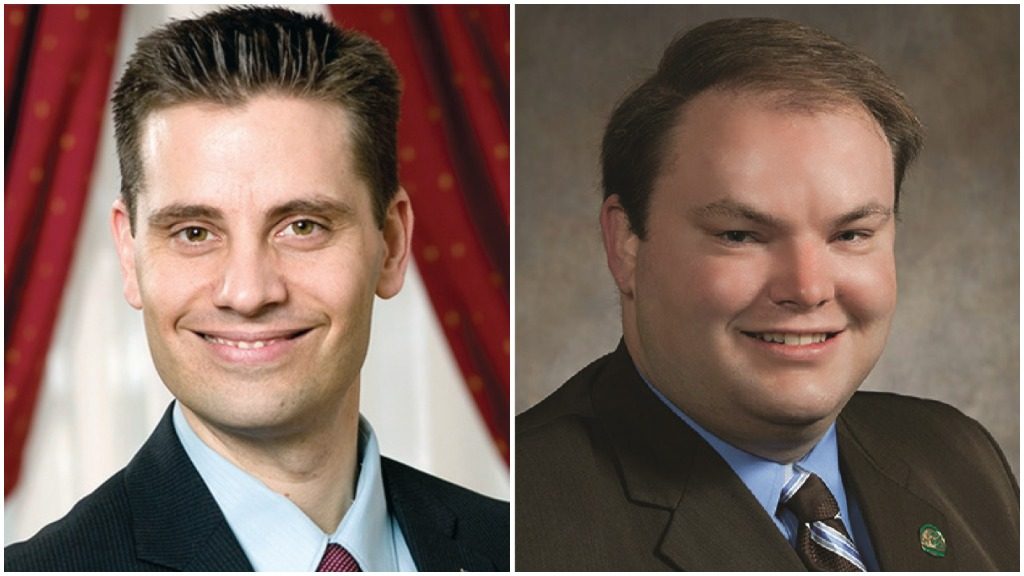GOP Bill Cuts Social Safety Net To Boost Hiring
Republican lawmakers would restrict access to healthcare, food assistance and unemployment insurance.

State Senator Chris Kapenga and State Representative Tyler August.
Proposals that the Republican authors rolled out Tuesday would address Wisconsin’s workforce shortage by increasing barriers to government aid programs, including Medicaid, Foodshare and unemployment insurance.
As employers have reported increased difficulty in filling job openings in the last year, analysts have pointed to a range of obstacles that have kept potential employees from being able to take jobs: the lack of access to affordable child care, transportation and some necessary skills. In the pandemic, fear of exposure to the virus responsible for COVID-19 has also discouraged some jobseekers.
“We’ve got a lot of high-paying, entry level wages, and then we have this large group of workers that have availability, we’ve got a skilled workforce in the state of Wisconsin,” said Sen. Chris Kapenga (R-Delafield), who blamed “this wall that it seems like the government has put in place” between the two.
The draft bills instead include a new limit on eligibility for Medicaid — called BadgerCare in Wisconsin. Under the proposal, recipients who turn down a job or a pay raise to avoid losing their eligibility for health insurance coverage would be kicked off the program for six months. The bill does not explain how violations would be monitored.
Another proposal would block the state Department of Health Services (DHS) from automatically renewing Medicaid eligibility for recipients.
A series of other proposals target the unemployment insurance (UI) system. One would cut the number of weeks a jobless person could collect compensation when the statewide jobless rate is low, while giving them more time to look for new work when the unemployment rate is high.
Another would rename the UI program to “reemployment assistance” and increase job search requirements for UI recipients. A third would disqualify benefits for the week if a UI recipient schedules a job interview but doesn’t show up. And a fourth would institute a series of tighter requirements for jobless pay, along with provisions to extend call center hours and reassign state employees to the system when claims surge, as they did early in the COVID-19 pandemic.
Another bill would reinstate the work requirement to the state FoodShare program that was implemented under then-Gov. Scott Walker in 2015 but that DHS waived during the pandemic. It would also require DHS to move forward with implementing a drug-testing requirement for FoodShare recipients.
An additional bill would require regular eligibility checks for aid programs and allow various programs to cross-check data to verify eligibility.
The premise common to all the pieces of legislation is that “people who are on benefits, government benefits, are not in the workforce,” Kapenga said. “We want to reduce that.”
Republican leaders want to get the package through the Legislature in the next six weeks. “We plan on acting on these in both chambers by the end of February before session adjourns for the year, said Rep. Tyler August (R-Lake Geneva) at the GOP press conference.
“Today’s GOP package fails to address the real challenges Wisconsin’s workforce faces,” said Assembly Minority Leader Rep. Greta Neubauer (D-Racine) in a statement. She charged that the Republican lawmakers “are doubling down on efforts to undermine Wisconsin’s unemployment system and jeopardize the critical assistance that keeps individuals and families afloat.”
The package was panned by health care and small business advocates.
“These ideas to punish workers by stripping them of unemployment insurance, health care and food for their families, including children, are deeply misguided,” stated Shawn Phetteplace, Midwest regional manager for Main Street Alliance, a small business group. “With the Wisconsin unemployment rate sitting at 3% and with major structural barriers for families, this is not the solution to our workforce challenges.”
Main Street Alliance has advocated expanding BadgerCare under the Affordable Care Act, allowing people with incomes up to 138% of the federal poverty guideline to be eligible for the program. Doing so would make it “easier for workers to increase hours,” Phetteplace noted.
The Legislature’s Republican majority has repeatedly rejected appeals from Gov. Tony Evers to accept the federally subsidized expansion.
William Parke-Sutherland, a health care specialist at Kids Forward, which analyzes policy and advocates on behalf of low-income families, said a full-time worker making minimum wage is already paid too much to qualify for Medicaid. But many low-wage jobs lack health insurance. “And there’s no requirement in the bill that the job that they’d be forced to take offers health insurance,” Parke-Sutherland said.
Democrats and advocates for the poor have long pointed out that some people who depend on Medicaid may be reluctant to take a wage increase that would disqualify them from coverage.
“People want to work, but when a 25-cent raise could result in losing access to critical medical care, it puts working families in an impossible position,” Sen. LaTonya Johnson (D-Milwaukee) said Tuesday. “Families deserve a clear, gradual pathway off of assistance programs — not to be thrown headfirst off a cliff into poverty.”
Johnson noted that the bills were being offered even as the state “is still in the midst of a global pandemic and is seeing record-breaking COVID-19 cases.”
David Riemer, a longtime analyst of job markets and labor markets, compared the premise behind the bills to claims that federal supplemental unemployment benefits in the first year and a half of the pandemic were responsible for the difficulty that employers had filling jobs. The evidence showed otherwise, said Riemer, who has served as an advisor to state and local governments.
“The big picture is a massive return of unemployed and underemployed Americans to the labor market,” said Riemer. “To imagine that we’re going to solve this problem by kicking more of the props away and only focusing on reducing the incentive to be ‘lazy’ and the disincentive to work — given what we’ve experienced since extended UI ended, that’s just a fantasy. It’s really not driven by data, it’s driven by ideology.”
This story was updated with the current title for Shawn Phetteplace of Main Street Alliance.
Republican bills would curtail benefit programs to boost hiring was originally published by Wisconsin Examiner.





















I absolutely love those pictures of Chris Kapenga and Tyler August. They both look like they could be possessed by the devil (Tyler August looks especially demonic!)
Republican Chris Kapenga complains when a family of four earning $18,000 per year receives food assistance for children.
But you never hear Kapenga complain when wealthy Republicans like Robin Vos receive $300,000 in COVID relief money from the government.
https://urbanmilwaukee.com/pressrelease/robin-vos-accepts-government-funded-ppp-loan-worth-up-to-300000-after-maligning-recipients-of-government-aid/
Clearly Wisconsin republican legislators don’t follow the data that giving folks money to help them get housing and pay basic living expenses helps them to get jobs.
https://www.npr.org/2021/03/04/973653719/california-program-giving-500-no-strings-attached-stipends-pays-off-study-finds
https://www.cnn.com/2020/10/09/americas/direct-giving-homeless-people-vancouver-trnd/index.html
Typical Republican thinking – Let’s punish the poor and lower middle class to benefit businesses – what does any expect from these folks?
Republicans have no qualms about cutting health care for the poor but will always be taking about the sanctity of life.
Duane–BINGO!
Nothing like starving poor children.
Thought I would add one more document link, from right here at Urban Milwaukee, that is contrary to the lies provided by these legislators, that the public safety net should be further cut: https://urbanmilwaukee.com/2022/01/21/state-jobless-rate-hits-record-low/
It shows the record low, unemployment rate of 2.8% in Wisconsin with a labor force participation rate at 66.4%. Which is 4.5% better than the national average. There just aren’t people in Wisconsin, available to fill the jobs.
Please, let us know the businesses that are pushing these legislators to take these draconian steps to punish poor people, all over the state, who are no longer willing or able to work multiple jobs to survive.